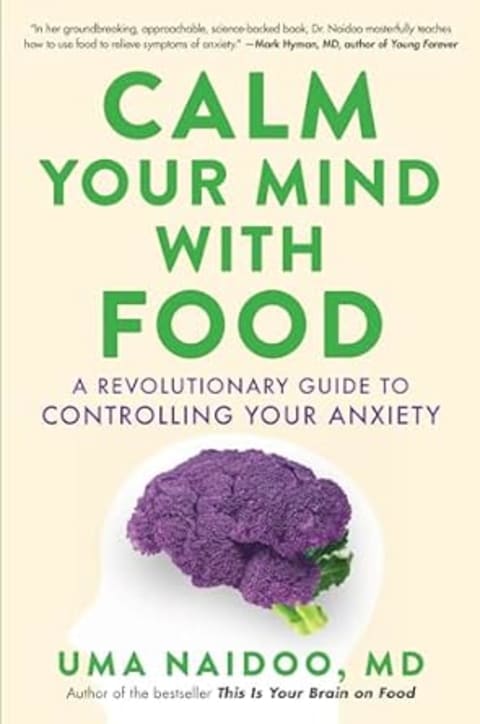Advertisement
The #1 Way To Quiet Anxiety For Good, From A Nutritional Psychiatrist


The most significant environmental factor for maintaining a healthy gut microbiome—and the one over which you have the greatest control—is your diet.
The food you eat has a major influence on the balance of your microbiota because your diet is also your microbiome's diet. You've heard of how pregnant mothers are "eating for two," but really, every person in the world is always eating for trillions.
And since different types of bacteria thrive on different kinds of nutrients, changes in food supply can lead to vast swings in bacterial populations. It's crucial to feed your microbiome in a way that promotes helpful bacteria and discourages harmful ones.
The role of the gut microbiome in anxiety
One of the crucial roles of your gut microbiome is to help your body produce neurotransmitters, chemicals that carry messages between your nerve cells.
Neurotransmitters are essential to a wide range of bodily functions—including movement and organ processes, like keeping your heart beating—but they are particularly notable for their role in cognition and mood.
Neurotransmitters like serotonin, dopamine, and gamma-aminobutyric acid (GABA) are all important in regulating brain function, and imbalances in neurotransmitter levels are a key factor in a range of mental health disorders including depression and anxiety.
Your gut bacteria have a key role in producing these neurotransmitters. As gut bacteria break down, or metabolize, their food, they create substances called metabolites, which influence neurotransmitter production.
Many of these metabolites are neurotransmitter precursors, building blocks that your body can assemble into complete neurotransmitter molecules. Others help trigger your body to make more neurotransmitters and to know when to release them.
Much of this neurotransmitter synthesis happens locally in the gut, where neurotransmitters help the enteric nervous system (ENS) regulate processes of digestion. The most important neurotransmitters, however, are the ones in your brain; that's where an upset in the chemical balance can cause anxiety.
Keeping your brain stocked with neurotransmitters isn't quite as simple as building them in your gut and shipping them up to your brain
As a protective measure, your body keeps your brain sealed off from your bloodstream through a complex defense system called the blood-brain barrier. Neurotransmitters cannot cross the blood-brain barrier, but their precursors can. So, precursors made by your gut bacteria are carried through your bloodstream, across the blood-brain barrier, and into the brain, where they are assembled into the neurotransmitters that help control your emotions.
Consider serotonin. Serotonin is an inhibitory neurotransmitter, which means it helps calm down your nerve cells, soothing them out of a frenzied state. Serotonin is thought to be one of the most crucial brain chemicals when it comes to anxiety; the most common type of drug prescribed to fight anxiety and depression is the SSRI, which increases levels of serotonin in the brain.
While serotonin plays a key role in your mood and emotions, 95% of your body's serotonin is produced in the gut, most of which stays in your digestive tract to help the ENS regulate digestion. Only 1–2% of your body's serotonin is produced in the brain.
Serotonin's precursor is the amino acid tryptophan, which you obtain through dietary sources like poultry and chickpeas. Your body relies on gut bacteria to metabolize tryptophan from the food you eat, creating a variety of metabolites and signaling a vast, complicated set of processes that lead to serotonin synthesis in both the gut and the brain. Every step of the process is influenced by a variety of different strains of gut bacteria.
Take a second to absorb that. Healthy brain function requires the right amount of serotonin. Making enough serotonin relies on both eating the right nutrients and having the right bacteria in your gut to facilitate the process of turning those nutrients into serotonin.
Therefore, if either of these factors breaks down—either you don't get enough dietary tryptophan or you don't have a well-balanced gut microbiome—your brain could run short of serotonin. And running short of serotonin puts you at risk for anxiety.
Taking an SSRI could very well help straighten out your serotonin levels, but SSRIs can have side effects and often require an arduous process of finding the right combination of drug and dosage.
On the other hand, changing your diet to promote gut health and give you a steady supply of dietary tryptophan is a no-risk first step that can achieve the same end goal as pharmaceuticals. While medication is certainly useful and even necessary in many cases, I feel strongly that dietary interventions are the right place to start. But they are often overlooked.
What this means for mental health
I want to be clear that serotonin is not the entire picture but just one of many compounds that play a role in mental health. In fact, in 2022, a much-discussed study posited that serotonin is not as important in depression and anxiety as has long been accepted.
But while that uncertainty can feel frustrating to those seeking to understand their mental health, I feel that it provides another strong argument for practicing nutritional psychiatry. Good gut health and nutrition don't just boost serotonin production; they also help ensure proper levels of a variety of other neurotransmitters—all of which play a role in your mental well-being.
For example, the neurotransmitter GABA is another central player in modulating anxiety response, particularly in the amygdala—the part of the brain that is the flashpoint for anxiety. GABA is also an inhibitory neurotransmitter, and when GABA levels are low, your amygdala can be more reactive, triggering strong stress responses when they're not warranted. Your brain is missing an important tool for keeping extreme moods under control, which can contribute significantly to anxiety.
GABA has been shown to be produced by certain gut bacteria, including Bifidobacterium adolescentis, so a gut imbalance that leads to a shortage of that species may mean a shortage of GABA in the gut and brain, thereby heightening the risk of anxiety.
The same is true of the neurotransmitters dopamine, acetylcholine, and glutamate, among possibly others. Furthermore, neurotransmitters and their precursors aren't the only compounds made by gut bacteria that play an important role in the brain.
Other compounds, like short-chain fatty acids (SCFAs) and brain-derived neurotrophic factor (BDNF), also have key roles in the relationship between gut and brain and also rely on gut bacteria to create them. BDNF assists with the stress response in the hippocampus and has been shown to fluctuate as gut microbiota change. SCFAs are created by bacteria breaking down dietary fiber. Recent studies have shown that low levels of SCFAs can yield greater anxiety and depression, while higher levels can lead to a reduction in both conditions.
Though most of this research is from preliminary animal studies, there is exciting potential in studying SCFAs more fully.
Check out my new book, Calm Your Mind With Food, to lean more about what types of foods are best for feeding the gut microbiome and, by extension, easing anxiety.
Excerpted with permission from Calm Your Mind With Food: A Revolutionary Guide to Controlling Your Anxiety by Uma Naidoo, M.D. (2023).


















